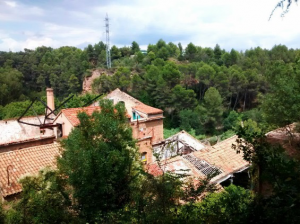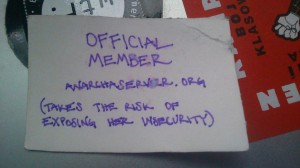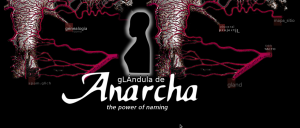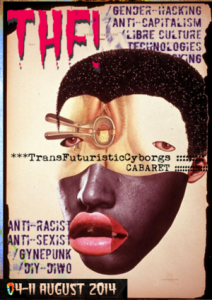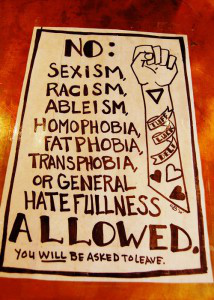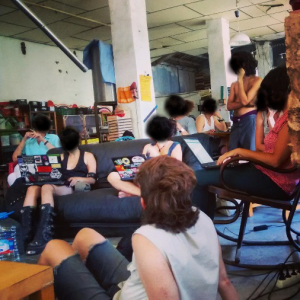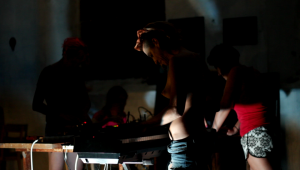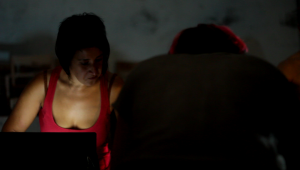Please note that you can aslo download this report in pdf format
High resolution
Low resolution
Introduction
The TransHackFeminist convergence was first organized in Calafou, an eco-industrial post-capitalist colony, located 60 km from Barcelona, Catalonia. For seven days, from the 4th to the 11th of August 2014, intersectional feminists, queer and trans people of all genders met to better understand, use and ultimately develop free and liberating technologies for social dissent. The participants of the THF! understand technologies and hacking practices in the broadest sense; this includes hacking the body, gynecology and gender hacking, as well as academia, parenthood, and also computer systems, (distributed) networks, autonomous servers, “pirate”, community based and/or independent radio/tv, hardware and electronics. Around 90 people came to the convergence, where discussions, panels, hands-on workshops and performances on a variety of subjects unfolded.
The following report is based on the main debates and discussions that took place during the THF!. More specifically, it is based on the notes taken collectively on local e-pads set up during the convergence. The report aims at sharing a summary of the collective thought processes that occurred and it is published with the idea that memory and archiving is empowering and essential for the transformation of social movements. It also recognizes that at a time of increasing instability (financial, social, theoretical, etc.) it is important to destabilize so-called accepted meanings. What feminism meant 30 years ago has changed and evolved into a plurality of meanings today. Context within a time-span becomes crucial to the understanding of a concept such as transfeminism, which carries different values depending on the location, space and/or political context, among others. What hacking meant 10 years ago (and what it still means in certain circles) might also be challenged to open new perspectives and praxis.
Motivations – Why was a THF! organized?
We started with the assumption that the lack of diversity, including the participation of women, queer, trans people in technological fields in general, and hacking more specifically, is acute. We considered as a starting point that the representations of such groups and of their “genre” are too often defined by those who are privileged to do so, while at times being remotely distant from a practice or wanting a certain representation to dominate the discourse. Moreover, we believe that these representations might not necessarily have accurate conceptions of what transfeminism and hacking means. As we are many at the forefront of these practices we decided that we needed to create space to meet others with whom we have affinities, but might not have known about because of a variety of factors such as geographical location, language barriers, silos, etc.
Another of our hypotheses was that to make our practice relevant and visible to ourselves and those interested by/in it, we needed to meet to discuss critical approaches towards technologies, hacking cultures and feminism. There was a clear desire to look at cyber and tech feminist issues from a politicized and holistic perspective as the video announcing the THF tried to expressThe intersectional analysis framework used during our convergence also fits our political project which aims at being truly cognizant of existing systems of oppressions. From the start, this approach required all of us to engage with the diversity of cultures, social status, sexual orientations, race, ethnicities and other power structures that create various forms and levels of inequality (in access, design, usability, hacking potential, etc.) for different individuals.
Before embarking on the THF! we believed that to have more feminist and intersectional activists and practitioners at the forefront of the use and development of liberation and (free)dom technologies, safe spaces to ignite desires were a must. Moreover, the THF! aimed at triggering this desire towards transfeminist approaches to technology and hacking that fostered differences, autonomy, liberation and social resistance. To reach out to a wide audience that might not have identified their practice as hacking, we made explicit the two following premises: 1) everybody is an expert in relation to the technologies they use in their everyday life, and 2) as we consider gender to be one of the most pervasive social technologies ever created, we were convinced that everybody had a lot to share on this topic too. Additionally, we wanted to convey the idea that we feel we are at a new dawn where feminist and intersectional technological resistance is arising. We wanted to join our collective forces in challenging systems of oppression that we encounter on a day-to-day basis. We wanted to collectively decry the so-called austerity measures, the financial system bankruptcy, mass surveillance, the infringement on privacy rights, governmental and business appetite for our (meta) data, the witch-hunts to rule our bodies, the criminalization of our reproductive rights, etc. Together we did not only want to reclaim, but take the opportunity to use and develop liberation technologies in fostering, caring and nurturing environments as far as possible from patriarchal and capitalist behaviors, thoughts and actions. Finally, the message we wanted to convey was: “We are building this from the ground up! Join us in imagining, crafting and developing the ‘opt out’ button(s) for a transfeminist insurrection.”
Experimentation fields: Feminist servers and Gynepunk
In order to investigate those potential opt-out buttons, we proposed in the call for participation two wide areas of experimentation namely: the development of Gynepunk practices; and Feminist servers.
Gynepunk is about engaging in a radical change of perspective about medical technologies, and the so-called “professional” and medical institutions. Gynepunk is an extreme and accurate gesture to detach our bodies from the compulsive dependency of the fossil structures of the hegemonic health system machine. Gynepunk’s objective is to enable the emergence of DIY-DIT accessible diagnosis labs and techniques in extreme experimentation spaces, down on the rocks or in elevators if it is necessary. It is about having these possibilities in a situated stable place or/and in nomadic mobile labs to be able to perform as much as WE WANT, in an intensive way: smears, fluid analysis, biopsy, PAPs, synthesize hormones at will, blood tests, urinalysis, HIV tests, pain relief, or whatever WE NEED. It is about hacking and building our own ultrasound, endoscope or ecography devices in a low-cost way. All this experimentation is made in complementarity with herbs and natural knowledges, oral traditions, underground recipes, seeking with hunger to generate a plethoraof DIY lubricants, anti-contraceptives, open doula domains, savage caring of any visceral hands-on technologies, such as menstrual extraction, all elevated to the maximum potential of common learning and radical self-body-power …!
Gynepunk is based on scientific methodologies and disciplines and relies on the knowledge that comes through the experience of each body and from ancestral body wisdom; that is also why documentation and memory under any form is essential! ANY format: visual treasures, sound mines, microscopic riddles, biologic cabinets, microbiologic growing centers, online seedbanks, fluids archives, fanzine (paper sms), oral decoding chorus, self voodoo healing rituals. Like those, gynepunks will ferment and mutate going fast forward to an explosive and expansive movement towards radical experiments, collective strong confidence, to build our-body politics; something that is vital to share and spread in infinite pandemoniums. Nobody can burn US! NO ONE! The witches NOW have the flames//
Feminist servers have been a topic of discussion, a partially-achieved aim and a set of slow-political practices among an informal group of transfeminists interested in creating a more autonomous infrastructure to ensure that data, projects and memory of feminist groups are properly accessible, preserved and managed. The need for feminist servers is a response to: the unethical practices of multinational ICT companies acting as moral and hypocrite censors; gender based online violence in the form of trolling and hateful machoists harassing feminist or women activists online and offline; the centralization of the internet and its transformation into a consumption sanctuary and a space of surveillance, control and tracking of dissent voices by government agencies among others. All these factors have led to a situation where the internet is not a safe space and where it is common to see feminist and activist work being deleted, censored, and/or prevented from being seen, heard or read. Freedom of expression is part of the feminist struggle and TransFeminists can contribute by providing collectively the knowledge and means to ensure their right to speak up remains accessible online, offline and wherever and under any format expression emerges. There will be no feminist internet without properly managed autonomous feminist servers. This is about regaining control and gaining autonomy in the access and management of our data and collective memories. It is also about being able to have feminist mailing lists, pads, wikis, content management systems, social networks and any other online services managed by feminist tech collectives. It is also of course about continuing to argue that social justice in technologically driven environments needs a more gender and culturally diverse presence in general. To achieve those objectives, many sessions during the THF discussed questions such as: what are the purposes of a Feminist Server? What makes a server autonomous and feminist? Where are possible (socially sustainable) models for those servers? How do we create trust among us to develop cooperative approaches to the management of those spaces of resistance and transformation?
Two feminist servers projects were rebooted during the THF!: the Systerserver6 project which was originally launched by Genderchangers and the Eclectic Tech Carnival (/etc) and which will focus on hosting online services; and the Anarchaserver7 which was launched by Calafou inhabitants and people involved in the organisation of the THF! and which will focus on hosting data. The latter currently hosts a mediawiki for the documentation of the THF! and a WordPress farm. Both projects are open, even though moderated, and they are using mailing lists and IRC channels to coordinate the several tasks that need to be achieved.
Convergence Agreement
Finally, to create a “safe space” rooted in a clear political project we set up boundaries from the get go. The agreement that we asked everyone to respect was the following:
Attendees are expected to treat all people and facilities with respect and help create a welcoming environment. If you notice behavior that fails to meet this standard, please speak up and help keep THF! as respectful as we expect it to be.
This is a transfeminist event and some behaviors are not welcome. Any kind of general hatefulness and disrespect will be deeply disapproved. We will not invite you to leave, we will directly kick you out. Long story short, if you behave like an ass-hole, THF! is just not the right convergence for you.
The THF! is a self-managed event. This means that all participants contribute to its contents, dynamics and logistics. During the event, and before, we will decide together which tasks should be achieved and everyone will contribute to their realization. We are not service providers; we all cook, recycle, clean, document, inform, take care of the temporal autonomous community we have created, and we have fun together!
The THF! and Calafou are totally committed to free culture protection and advancement. Therefore, if you want to produce an article, piece of audiovisual or any other type of multimedia coverage of the THF! and/or Calafou you should release the material under a free license. Read our media protocol8 if you want to produce something about Calafou in order to contribute to the documentation and coverage of the THF! 2014 event.
This political project is located in a space with various particularities. Calafou has developed from an abandoned space into a place of life. It is composed of shelters to accommodate visitors innew homes, there are spaces and workshops for productive projects. It has numerous infrastructures for the commons; such as a kitchen, dining room, hacklab, chicken hutch, compost space, cleaning point, social center and free store. Now, it should be noted that it is an eco-industrial project; it is not an agricultural or health project, nor an eco-village or a retreat space to work on spirituality or existential doubts. It is not yet an idyllic place to enjoy nature and the environment, though we will all work for that to happen one day.
The meaning of THF!
During the THF! a discussion was started about the meaning of TransHackFeminism. What do those three concepts mean as a whole? How could we connect the dots between them? As we were coming from different perspectives, trying to figure out what THF! meant for us as a group was an important part of this gathering. Reflecting on its meaning(s) meant pushing the boundaries of what was possible for us to imagine together and opening up possibilities. It was also to try to not fear certain practices that we might not have understood because of a lack of interaction, exposition or dialogue.
This collective reflection is an on-going process in which we want more people to participate. This is not a fixed process or concept. It’s understanding will be fluid and open. The following is a summary of the main discussions and debate that took place during the Meaning of THF! sessions.
First, separating the THF! concepts helped us identify the roots behind each one and therefore made it more intelligible. The discussion started with the importance of understanding TransFeminism (TF) as a standalone concept that already existed in theory and practice. Only two main trajectories were presented about TF and hence it is important to mention that other trajectories exist, but were not the focus of the discussions and thus will not appear in this report.
In the US context, TF was a critique addressed by the so-called second wave of feminism in that ithad not been able to keep pace with non-normative genders as they are thought, embodied and lived. At the same time, there was also the recognition that transgender studies cannot exist without feminism, otherwise it risks focusing too much on the subjectivity of individuals (where it is mostly the identity of the person that matters) and thus risk entering into a very liberal discourse about identity where collective dimensions are made invisible and social resistance becomes even more difficult.
The other trajectory presented was the one from Spain. It started by highlighting that on January 1, 2010 a manifesto for a Trans-Feminist insurrection was launched. This text was a reaction to a political context in which the LGBTQI community felt they were discriminated against and/or not enough taken into account by more traditional feminist movements. The date of publication of the manifesto aligns itself with the Zapatista struggle launched on January 1, 1994, when rebellious communities descended from the hills and triggered one of the most significant revolutions of the late twentieth century. Moore recently, in 2013, an anthology about Transfeminismos was published which focused on different themes such as the economy, relationships and technology. It had no central position, other than having the intention to re-think feminism.
For many of the participants, TF is far from being only about questions of identity, it is also and especially about the re-politicization of feminism. For Spanish participants particularly, TF is about making explicit the link with anti-capitalist perspectives in contrast with the US tradition where this direct connection is either not present, or not made so explicit. In this way, TF opens the possibility to experiment with new spaces and practices, to go beyond binaries and cross borders; there is the will to experiment with the body, with technology and to interconnect those through theory and practice. From there the conversation focused on possible principles that could represent THF!.
First of all, the word “trans” needs to be understood in its plurality of ways. Trans as a noun, a verb, and a prefix. Being in transition, in transformation, being transgendered, being transversal, transdiciplinary, etc. Trans as a verb meaning interrogating, crossing, fusing. From that starting point, THF! allows for expansion, interconnection, the crossing of physical and metaphorical borders. It also points to the fact that the concept is constantly evolving, acknowledging that when notions become fixed or closed they also begin to die.
The term “hack” refers to the more traditional act of doing, of taking things apart, of understanding things in a deeper way. But it is also seen as an action and as a performance in order to hack patriarchy, capitalism and other systems of oppression, and by making those systems explicit. THF! is also about being aware and acknowledging one’s privileges. It is about understanding the relations between privilege and oppression. A THF! practice is about being anti-racist, anti-capitalist, anti-sexist, anti-abelist, anti-homophobic, anti-transphobic, and using hacking as a mean of resistance, sabotage and transformation.
Finally, the word “hack” also introduces the dimensions of contagion and contamination – understood in a positive light. Those “viruses” that hackfeminism and transfeminism introduce new modalities of seeing and viewing the world that help to break the binaries (male vs. female, theory vs. practice, who produces vs. who consumes knowledge, tech activists vs. activists, etc.). The concept of virality is also linked to authorship and the public domain – in the sense that it is there to be re-distributed, remixed, re-purposed and logically also hacked.
Content
The content presented and produced during the THF! broadly fits into three main themes: Embodied Theory, Performative Tactics and Liberating Technologies.
Embodied Theory: This stream of the program refers to the activities where content and theories were embodied by the participants. Embodied theories are theories that are lived and experienced. They emerge from the ground up; from activists’ particular experiences and/or positionality. Embodied standpoint theories aim at reconfiguring theories by limiting and reducing the existence of binaries, particularly the distinction between researchers and activists, and theory and practice. For the THF! embodied theories was about the extent to which activists can be living embodiments of a chosen theoretical or hermeneutical path. It was about trying to find answers to the following questions: How does embodied knowledge shape us in terms of social interaction, perception, subjectivities, etc? What do embodied theories do to us? Does embodied theory come to be through practices and/or the belief in a theoretical framework? The following presentations and discussions explored those questions:
Hacking Gender Construction: The raison d’être of this session emerged out of a need and desire to look at how gender is constructed in society. It started from the assumption that once we understand how gender is constructed, we can hack the concept. The session outlined in 10 steps how to set up biased gender constructions and served as a reminder of the domination of certain scientific, social and cultural assumptions in society.
AnarchaGland: This presentation aimed to highlight the racist and sexist history behind gynecology. Marion Sims, a slave doctor in 1840s in Alabama, is recognised as the father of modern gynecology. What is rarely told is the ways in which he used women slaves with fistulas, often without anesthesia, to “unearth” the female body. The AnarchaGland project aims at rendering visible the women slaves involved in this practice and how racist and sexist the practices were.
What is Genitalism? The presentation aimed at demystifying what genitalism is specifically and more broadly to demystify the use of language in emancipative contexts.
Hacking the Academia: The starting point with this session was how do you position yourself as a queer, feminist or transfeminist in academia? This session was rooted in personal experiences of how to hack academia in concrete terms to be able/or try to attempt to position oneself asgenderqueer or transfeminist within a university setting.
Crips are Hot and They Fuck: The session highlighted the intersection between hacking, sexuality, queer and disability studies. It highlighted the untold history of activism and disability in Europe and North America and argued that for a vibrant queer politics to exist, it must incorporate a vibrant crip politics.
Cyborg Romanticism: This session aimed at investigating cyborg ideologies. It explored the assumption that cyborgian romanticism and futurist fetishization might be leading to further exploitation and degradation of our natural environments, and to a potentially techno-fascist climate.
Hacking the Baby: This workshop aimed at talking and sharing about alternative ways of parenting. Some of the questions discussed were: How to educate your children to be people outside of the dualism man/woman? How to overcome traditional family structures and build informal support networks that work and do not reproduce the paranoia of the traditional family?
To read the notes from each activity, visit the THF! wiki hosted on the Anarcha server
Performative Tactics. This stream of the program refers to the tactics that are being used by the participants to circumvent political, economic, social and/or cultural barriers through performances. Performative tactics are actions, practices and/or projects that activists undertake to raise consciousness, bring political issues to the fore, prefigure the world they want to live in, and reframe or disrupt dominant narratives in creative ways. These tactics are performative in the sense of committing an action and possessing agency. The performative tactics undertaken at THF! took shape through the following presentations, lived projects and/or discussions:
The Fellatio Modification project: The presentation highlighted that the project was conceived as a series of oral modifications with dental technology and tissue engineering. The purpose of this project is to enhance the physical pleasure of having oral sex for gay people.
Satellite Fishing: This session first aimed at showing the extent to which satellites are ubiquitous in the sky and how easy it is to identify them. Secondly, it aimed at defining the space above us as « Public Space » and therefore reclaim it as a sphere for collective debate and decision about the usage of it and the questions and concepts asked and developed around it.
Public Key Signing Ceremony: During the THF! convergence a public key signing party was organized to enable participants to verify the authenticity of keys owners and contribute to the expansion of the web of trust. The face-to-face meeting was the perfect opportunity for a group to have a live exchange of keys through a hacker ceremony.
Feminist Tactics on the Net: This session aimed at sharing collective tactics that have been developed on the internet by feminists, and the ways in which to improve the connection between feminist groups when developing campaigns and/or actions in cyberspace.
Zine Repositories: This session discussed the importance of zines andine-making as a form of hacking the press and as a DIT practice, and of having a collection of zines online and on a mesh network. Out of this session a list of web platforms where you can enjoy a variety of feminist zines was generated.
Public Digital Libraries: This workshop was aimed at rethinking the infrastructures of knowledge production. First a discussion was organized on the ways in which we can preserve and disseminate the collective memory of social movements and critical thinking in general through the making of digital public libraries (e.g. memory of the world, aaaaarg, monoskop, library genesis) Second, it allowed participants to learn how to use a book scanner, to install and configure free programs and applications for building catalogs efficiently on the internet among other things.
Emancipatory Theatre: This workshop was based on various experiences of participatory theater in rural and urban areas in different parts of Latin America. The main goal was to build a collective dramaturgy and scenic elements that emancipatory praxis allows.
Death Cafes: A “Death Cafe” was organized where people could talk about all things related to death and dying. The objective was to increase awareness of death tabus with a view to enabling people to make the most of their (finite) lives.
FollonNoiseX: This workshop aimed at playing around with and learning by doing via the making of audiovisual installations that involved electronics, bending circuits and home made instruments.
The Cyberperformance UpStage software: The THF! participants got familiar with UpStage, an open-source web-based platform for cyberformance. Workshop participants in Calafou learned how to create media for and use UpStage and developing ideas for their performance. Remote participants joined on the night on the Cabaret for an improvised performance.
The Cabaret: Trans Futuristic Cyborgs: On the last day of the THF! a Trans Futuristic Cyborgs Cabaret was organized. The following groups and collectives performed at the Cabaret: Pornotrash, Darkbaider Y Mari Pili, Upstage Jam, Boca de Baba, VaginoPlastia, Perkances por un Tubo and Miss Sasa.
To read the notes from each activity, visit the THF! wiki hosted on the Anarcha server
Liberating Technologies. This stream of the program explored a variety of technologies that can be considered to be liberating. Liberating technologies are rooted in libre/free culture and its participants aim to embrace, protect and advance it. We consider corporate social media corporations (a.k.a. data empires) such as Google (we do believe Google particularly to be evil, despite it’s moto: « don’t be evil! ») as having dire consequences on our private and collective lives. The profiles that are created about us when we use corporate social media platforms and search engines, record every bit of data we produce for economic, political, social and/or mass surveillance purposes. Corporations now act as mediators of our communications and in turn manipulate how we understand the world around us. Liberation technologies for us mean taking back the control of the internet, infrastructure, algorithms, inscribing new values in code, among others. Many of the activities organized under this category aimed at enhancing skills through hands-on workshops and presentations. They included:
The Gynepunk BioLab: This visual presentation aimed at presenting what a Gynepunk Lab consists of. It showed the most common test in obstetrician/genecology, the techniques (extraction, treatment, diagnosis) used, the basic hardware needed, the sanitary conditions needed and the patterns commonly used in various diagnostic tests (such as for Candida vaginitis, Gardenella, tricomonas, PAP, etc.)
Del EM Menstrual extraction system: Based on a text by Rebecca Chalker entitled: “The Whats, Hows and Whys of Menstrual Extraction” this workshops aimed at discussing the history behind the desire to have control over our reproductive system.
Feminist Recreation on the Internet: This practical workshop aimed at developing personal or collective videographic discursive interventions. Participants worked primarily through dubbing and subtitling as a form of critical intervention using feminist discourse. This feminist recreation workshop was based on the appropriation of previously existing materials, focusing on the (re)production and hacking of mainstream videos.
R_R/R – Radio Ramona and Ruelles: This hands-on workshop introduced Radio Ramona and Ruelles, a mobile online streaming unit that uses a Raspberry Pi, battery, a wifi Dongle, a USB soundcard and a powered USB hub. This performative session aimed at explaining how to build it yourself, contextualize the projects and articulate a critical approach towards technological tools for a common voice.
“Weapons” of Mass Destruction: This theoretical and practical workshop aims at learning how to use certain tools for online documentation such as hotglue and GIMP.
How to play with your computer without knocking off the system or the virtual machine(s): This virtual node aimed at learning how to play with your computer through a variety of techniques and tricks.
Digital security and circumvention: During this session participants discussed and made a list of digital security manuals that exist in many languages and which have a feminist, queer/trans angle or which are activist-oriented.
Open Street Map Mapping Party: A mapping party which comprised a talk, a walking tour, and a hands-on tutorial. The goal of two-part session was a feminist strategy of what to map and what not to map in the surroundings of Calafou. It is in this context that participants took a walk to explore and map the local area through walking, observing, watching, listening and sensing collectivelly and individually.
Screening of Documentaries: During the THF! a few documentaries were shown including: Ruins VIH witch Hunt, Mi sexualidad es una creacion artistica (My sexuality is an artistic creation), Dreceres, a film about the Integral Catalan Cooperative that presents Calafou.
To read the notes from each activity, visit the THF! wiki hosted on the Anarcha server
Conclusion – Join us for the organisation of the next THF! 2015 in Puebla (Mexico)
To wrap up, THF! is about:
-
Enhancing our personal and collective lives, as it allows us to push the boundaries to further (re)think certain (basic) assumptions.
-
Opening up possibilities to experiment and understand life as a performance and a permanent process of performativity.
-
Collectively producing knowledge: without making a differentiation between theory and practice.
-
Embracing, protecting and advancing libre/free culture.
-
Creating communities where people meet, exchange, experiment and share knowledge.
-
Setting up boundaries by positioning one’s self vis-a-vis other feminist discourses and narratives. It is a re-politicisation of feminism.
-
Anti-capitalism through alliances and solidarity thanks to Do-it-yourself (DYI)/Do-it-with-others (DIWO)/Do-it-together (DIT), self-management and autonomy practices.
You can also view short videos of the first THF! Here and There. If you like this report and want to contribute to the development of the next THF! you can subscribe to our moderated mailing list at thfeminist@lists.riseup.net. Please introduce yourself briefly to the administrators in order to be subscribed to the list and let’s move ahead with the organization of this self-managed and radical TransHackFeminist event.
Next THF will take place in Puebla (Mexico) from the 25 to the 31 of May 2015. See you soon!
